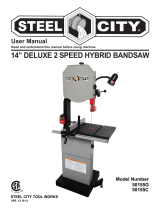G1258 20" Bandsaw -15-
A bandsaw blade is a delicate piece of steel that
is subjected to tremendous strain. You can obtain
long use from a bandsaw blade if you give it fair
treatment. Be sure you use blades with proper
width and temper for the various types of cutting
operations.
Always use the widest blade possible. Use nar-
row blades only for sawing small, abrupt curves
and fine detail work. Blades may be purchased
welded, set and sharpened ready-for-use. We
supply 154
1
/2" bandsaw blades in
3
/16",
1
/4",
3
/8",
1
/2",
3
/4", 1" and 1
1
/4" widths for this saw. Refer to
our current catalog for prices and ordering infor-
mation.
Always select and use good-quality saw blades
and choose the right blade for the right job. Poor
quality blades and improper use are often the
cause of premature blade failure.
Many conditions may cause a bandsaw blade to
break. Blade breakage is, in some cases,
unavoidable, since it is the natural result of the
peculiar stresses that bandsaw blades are sub-
jected to. Blade breakage is also due to avoid-
able circumstances. Avoidable breakage is most
often the result of poor care or judgement on the
part of the operator when mounting or adjusting
the blade or support guides.
The most common causes of blade breakage are:
(1) faulty alignment and adjustment of the guides,
(2) forcing or twisting a wide blade around a
curve of short radius, (3) feeding too fast, (4)
tooth dullness or absence of sufficient set, (5)
excessive tension, (6) top blade guide assembly
set too high above the workpiece, (7) using a
blade with a lumpy or improperly finished braze or
weld and (8) continuously running the bandsaw
when not in use.
When installing a new blade, inspect its weld and
file smooth, when necessary, prior to operation.
Blade Information
Resawing is the process of cutting a board into
two or more thinner boards. The maximum board
width that can be resawn is limited by the maxi-
mum cutting height of the bandsaw. Maximum
cutting height for this bandsaw is 13".
The Model G1258 bandsaw is highly capable of
resawing, provided the saw is set up properly.
Use common sense when resawing. Attempting
to resaw too wide or too dense a board may put
excessive strain on the blade and be dangerous.
The important consideration when resawing is
blade selection. Generally, the wider blade, the
better your results. In most applications, a hook
or skip tooth style will be sufficient. Since most
resawn lumber will be planed smooth, choose
blades with fewer teeth-per-inch (from 3 to 6).
While blades with fewer teeth-per-inch produce
rougher cuts, these types of blades offer larger
gullet capacities for clearing sawdust, less heat
buildup, and yield more horsepower per tooth.
Resawing
Figure 16. Proper method for resawing lumber.
1. The bandsaw must be adjusted correctly.
See Blade Adjustment Section.
2. The table must be square to the blade. See
Table Adjustment Section.
3. Use the widest blade available. The blade
must also be in good condition.
4. Use a fence to guide work.
























